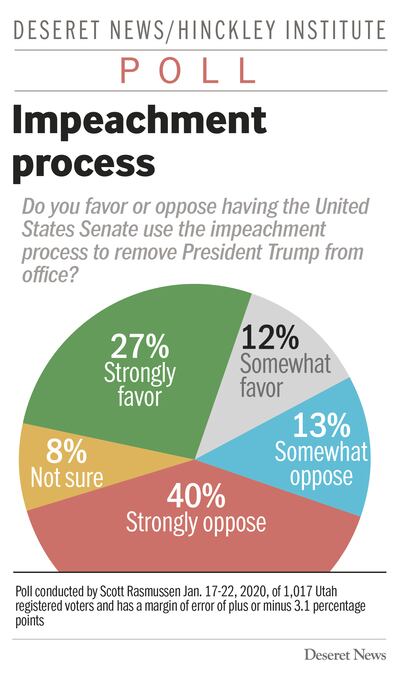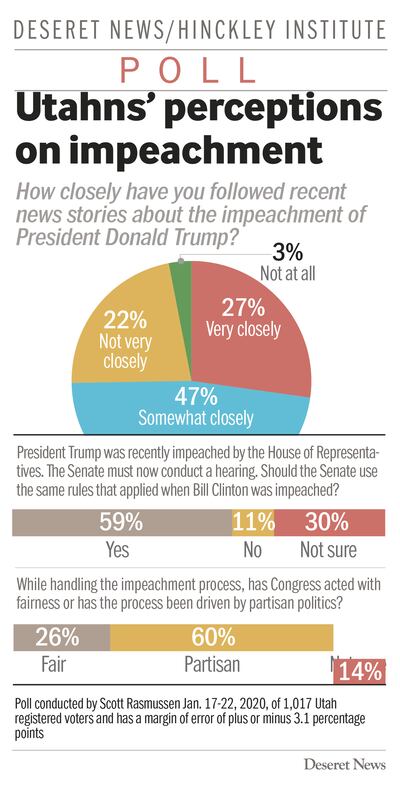SALT LAKE CITY — A slight majority of Utahns — who overall are paying attention to the impeachment case — don’t want the Senate to remove President Donald Trump from office.
Though Utah voters reluctantly elected Trump in 2016, a new Deseret News/Hinckley Institute of Politics poll shows 53% oppose the president losing his job, and 40% do so strongly. The survey, conducted by pollster Scott Rasmussen, showed 39% favor removal from office, while 8% are unsure. Trump won Utah with only 45% percent of the vote.
“The desire to keep him in office is a little bit softer than it is nationwide, which would be consistent with Utah’s perspective and history,” said Rasmussen.

The partisan breakdown, though, is the biggest indicator in the poll of where Trump sits among Utah voters. The survey shows 76% of Utahns who identified themselves as Republicans are sticking by Trump, while 83% of Democrats want him out. Independent voters are split, but leaning a little against having him removed.
The same pattern is playing out nationally.
“When it comes to a lot of national issues these days, it’s become a team sport. If Republicans say the sky is blue, Democrats will deny it. If Democrats say water is wet, Republicans will say no it’s not,” Rasmussen said.
Women and voters under age 35 were more inclined toward removing Trump than were men and older voters, according to the poll. Members of The Church of Jesus Christ of Latter-day Saints are more opposed to removal than were Protestants and Catholics.
Rasmussen surveyed 1,017 Utah registered voters Jan. 15-22. The poll has a plus or minus 3.1% margin of error.
The House impeached Trump in December, charging him with abusing his office by asking Ukraine for politically motivated investigations of former Vice President Joe Biden, a frontrunner in the upcoming Democratic primaries, while withholding military aid from the U.S. ally that’s in a territorial war with Russia. Trump is also charged with obstructing Congress by refusing to turn over documents or allow top aides to testify in the House probe.
Only 26% of Utahns say Congress has handled the impeachment process fairly, while 60% say it is driven by partisan politics. Again, there is wide gap between when it comes to party affiliation, with 75% of Republicans seeing the process as partisan, compared to 32% of Democrats.
“Even if you’re not sold on President Trump, if you think it’s an unfair process, you’re not likely to have him removed because of it,” Rasmussen said.

One question at the heart of the fairness issue is whether the Senate should call witnesses. Utah’s two Republican senators are divided on that topic. Sen. Mitt Romney said Monday he is likely to vote for hearing from former national security adviser John Bolton, while Sen. Mike Lee has said additional witnesses won’t add anything to the trial.
The poll showed three-fourths of Utahns — 27% very closely and 47% somewhat closely — are following news stories about impeachment.
Anyone who follows the news can’t miss stories about impeachment, though Sunday’s tragic death of Kobe Bryant and the upcoming Super Bowl certainly have diverted people’s attention from Washington. Television viewership of the Senate trial has been small and declining, partly because the outcome is believed to be known.
“It’s clearly not a top of mind issue,” Rasmussen said.
The survey also showed 59% of Utahns believe the Senate should apply the same rules to Trump as it did in Bill Clinton’s impeachment trial, while 11% say it should not. The remaining 30% percent weren’t sure.


